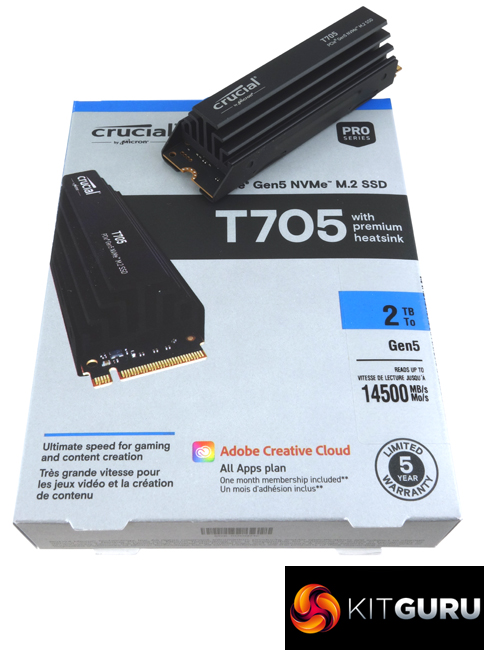Not one to rest on their laurels, Crucial decided that the Gen 5 T700 isn't quite quick enough, so we now have the T705, the new flagship of the company's SSD range. Although basically using the same hardware as the T700, the T705 has everything turned up to the max – so instead of the 12,400MB/s and 11,800MB/s for Sequential read and writes respectively for the 2TB T700, the new 2TB T705 drive is rated at up to 14,500MB/s for reads and 12,700MB/s for writes.
As with the T700, the T705 is available in three capacities; 1TB, 2TB and the 4TB flagship drive. It comes in two main versions, plain and a factory-fitted passive heatsink. A limited edition 2TB drive is available with a white heatsink.
The drive uses the familiar combination for fast Gen 5 drives; a Phison PS5026-E26 8-channel controller and Micron 232-Layer 3D TLC NAND. But whereas early adopters had the controller and memory running at 1,600MT/s and more recently 2,000MT/s (like Crucial's T700 drive), the T705 has the controller and NAND clocked at the full 2,400MT/s speed, hence the headline 14,500MB/s read performance.
The fastest drive in the range is the 2TB model with ratings of up to 14,500MB/s and 12,700MB/s for Sequential reads and writes respectively. Next up is the 4TB drive rated at up to 14,100MB/s for reads and up to 12,600MB/s for writes. The 1TB drive gets figures of up to 13,600MB/s for reads and up to 10,200MB/s for writes. 4K random performance for the 2TB and 2TB models is quoted as up to 1,500,000 IOPS for reads and up to 1,800,000 IOPS for writes. The 1TB drive makes do with up to 1,400,000 IOPS and up to 1,750,000 IOPS for reads and writes respectively.
When tested with the ATTO benchmark, the best figures we could get from the drive were 12,970MB/s for reads and 11,880MB/s for writes both of which were well short of the official ratings particularly that read figure. We could however confirm the official figures with the CrystalDiskMark 8 benchmark, with a read test result of 14,506MB/s with writes coming in at 12,739MB/s.
As for random performance, using our four threaded tests we could get anywhere near the official 1,550,000 IOPS and 1,800,000 IOPS for read and writes with test results of 531,443 IOPS and 454,432 IOPS respectively. Switching over to the Peak Performance profile of CrystalDiskMark 8 we could confirm the official random read figure with at test result of 1,575,736 IOPS. Writes on the other hand at 1,657,672 IOPS came up short of the official rating of the drive.
As ever with the current crop of Gen 5 drives they need some form of cooling as they get very hot when they are pushed hard. If you choose the plain version of the T705 then you must use some form of motherboard or 3rd party cooling to keep those temperatures under control. If you don't have any motherboard cooling then the heatsink version of the T705 is the one to go for especially as its heatsink is one of the more compact we've seen.
While stocks last Crucial is offering a one-month complimentary Adobe Creative Cloud personal All Apps plan when you purchase and register a Crucial T705.
We found the 2TB Crucial T705 with Heatsink on Crucial's website for £508.79 (inc VAT) HERE.
Discuss on our Facebook page HERE.
Pros
- Extremely fast Sequential performance.
- PCIe 5.0 interface.
- Heatsink design.
- TCG OPAL 2.01 encryption.
Cons
- Needs a PCIe 5.0 M.2 slot to get the best out of it.
- Pricey.
KitGuru says: Crucial's T700 was a very fast drive but not content with that, Crucial has upped the ante with the T705, the fastest drive we've seen in many of our tests. The Heatsink version is handy for those without any form of motherboard cooling but you do have to shell out 48 quid extra for the privilege over the standard model.
 KitGuru KitGuru.net – Tech News | Hardware News | Hardware Reviews | IOS | Mobile | Gaming | Graphics Cards
KitGuru KitGuru.net – Tech News | Hardware News | Hardware Reviews | IOS | Mobile | Gaming | Graphics Cards




